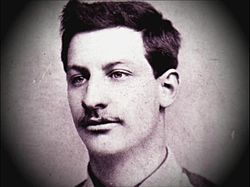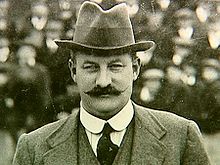Billy Bassett
| Billy Bassett | ||

|
||
| Personnel | ||
|---|---|---|
| Surname | William Isiah Bassett | |
| birthday | January 27, 1869 | |
| place of birth | West Bromwich , England | |
| date of death | April 8, 1937 | |
| Place of death | West Bromwich , England | |
| position | Right winger | |
| Men's | ||
| Years | station | Games (goals) 1 |
| Christ Church School | ||
| Oak villa | ||
| West Bromwich Strollers | ||
| Old Church | ||
| 1886-1899 | West Bromwich Albion | 261 (61) |
| National team | ||
| Years | selection | Games (goals) |
| 1888-1896 | England | 16 ( 7) |
| 1 Only league games are given. | ||
William Isiah "Billy" Bassett (born January 27, 1869 in West Bromwich ; † April 8, 1937 ibid) was an English football player and then worked for many years as a functionary and chairman.
He was in the service of West Bromwich Albion for over 50 years and is therefore one of the most important personalities of the club from the West Midlands .
Player career
Billy Bassett, who was born in West Bromwich, played in various amateur clubs in his hometown and was initially considered too "fragile" for professional football due to its small size. With consistently good performances as a winger in the youth team of the West Bromwich Strollers, he recommended himself sustainably and so he joined the "big" West Bromwich Albion in August 1886 . He came for his new club for the first time on Easter Monday, April 11, 1887, where he made his debut against Third Lanark in the FA Cup . His first appearance in the First Division was on September 8, 1888, when the Albions won 2-0 away at FC Stoke. The first goal in the first division he succeeded in his second game on September 15, 1888, an away game against Derby County, which West Bromwich Albion won 2-1. In the further course of his early career, he was mostly drawn to the right side of the wing and there he showed above-average ball control and high speed in his game, and was also considered a goal threat. At the age of 19 he was in the final of the world's oldest national soccer cup on March 24, 1888 and performed well in the 2-1 win over Preston North End . He prepared the opening goal of Jem Bayliss to 1-0 with a dribble and, according to the author Philip Gibbons, "tortured" the defensive ranks of the Preston men, who were considered "unbeatable" a year later. Further career highlights followed, beginning in the same year with a defeat against the Scottish Cup winner FC Renton - a game hyped up to the "world championship". Just seven days after winning the English Cup, he played his first international match in a 5-1 win over Ireland . His first goal for England followed in February 1889 on his second appearance, when Wales was clearly defeated 4-1.
Bassett, who scored eight goals in a total of 16 international matches between 1889 and 1896, played with the "Baggies" until the end of the 19th century and established himself as one of the first "celebrities" among football players. Although he was also a significant part of the team in the national league launched in 1888 with 261 games and 61 goals, his successes were limited to the FA Cup. Around four years after winning the first cup, Bassett and his team were again in the final, in which he faced Aston Villa on March 19, 1892 . There he was involved in the first two goals for a clear 3-0 win against the initially superior "Villans". Three years later, the final opponent took revenge on the WBA and prevented Bassett's triple cup triumph with his 1-0 victory.
His active career ended on April 24, 1899 with a clear 1: 7 defeat against this opponent. Bassett, who was expelled on April 28, 1894 on the occasion of a friendly game against Millwall Athletic because of the use of "inappropriate language" as the first player of his club of the field, ended his career after a total of 311 games and 77 goals at the age of 30. In addition to the English national team, he had also been in a selection of the Football League three more times between 1891 and 1897.
Term as an official
After Bassett briefly coached the youth team from West Bromwich Albion, he joined the club in particularly difficult times in 1905. After relegation the year before , the entire board had resigned and the financial situation had deteriorated significantly. Bassett managed with the returning ex-chairman Harry Keys to settle the short-term debt by raising large sums of money in the community. Bassett took the chair himself in 1908 and two years later again prevented the bankruptcy of the association; He paid the outstanding player salaries in the summer out of his own pocket. He rarely missed a board meeting, and the 1936 annual general meeting, marking his 50-year association with the club, resembled an anniversary celebration.
Bassett also took on duties as a functionary outside the club's boundaries. He was also a sponsor of the Football Association and the Football League, on whose committee he sat from August 1930. His identification with national football went so far that he lived the rivalry with the arch-rival from Scotland. During his tenure, he did not sign a single Scottish player for West Bromwich Albion.
Billy Bassett died on April 8, 1937 in the town he was born in. When "his" club played the FA Cup semi-finals against Preston North End in Highbury two days later , he thought of a minute's silence - the visibly sad Baggies were clearly defeated 1: 4. More than 100,000 spectators gathered in the streets of West Bromwich for his funeral procession. In 1998, more than 60 years after his death, the League Association posthumously included him in their “ Football League 100 Legends ” list of the best, underscoring Bassett's long-term importance in English football.
successes
- English cup winner : 1888, 1892
literature
- Matthews, Tony: West Browmich Albion - The Complete Record . Breedon Books, 2007, ISBN 978-1-85983-565-4 , pp. 100-101 .
- Michael Joyce: Football League Players' Records. 1888 to 1939. (p.19) , 4Edge, Hockley, Essex 2004 ISBN 1-89946-867-6
- Yore Publications: Famous Association Footballers 1895 , 12 The Furrows, Harefield, Middx ISBN 1-874427-37-2
Web links
| personal data | |
|---|---|
| SURNAME | Bassett, Billy |
| ALTERNATIVE NAMES | Bassett, William Isiah |
| BRIEF DESCRIPTION | English soccer player |
| DATE OF BIRTH | January 27, 1869 |
| PLACE OF BIRTH | West Bromwich |
| DATE OF DEATH | April 8, 1937 |
| Place of death | West Bromwich |
